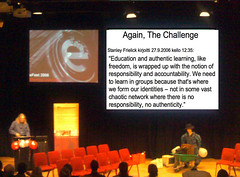
(click here for larger image)
Been taking a break from work to recharge after a hectic few weeks – and letting the ongoing discussion about groups, networks and the future of learning wash over me, reading all the posts, but having a more private inner dialogue. The challenge that all of this is posing for me is how to make my own ecological thinking more accessible – more in the ‘network’ rather than the ‘group’ as Stephen would suggest. Although I’m still not clear exactly what the differences are when those terms are used. Like Teemu I think there is a lot of confusion in the FLNW debate about “group learning vs network learning, formal learning vs informal learning”, but I also think that Stephen, Leigh, Mark and the other many contributors are debating something very important for the future of learning – although it should be rephrased as the future of learning in institutions.
Or more simply, the FLNW tour and ensuing debate is actually about the future of learning institutions in a networked world. In my view ‘learning’, or the biological process of transforming information into knowledge, is a constant in the ecological activity of the planet, and isn’t really going to change its nature with the advent of a new technology or modes of engagement for learners. What will change however, is the obsolete institutional form that evolved in response to specific historical circumstances, economic imperatives, and technological affordances. The exemplar institution here is the university, and the form is specifically the 17th-century dualistic way of of thinking that is embedded in the very fabric of the institution.
When I posted about the way I saw the non-difference between groups and networks (an excerpt from which Stephen cited in his eFest keynote) I was trying to point out that networks are aggregates of groups, in the same way that an ecosystem is composed of many interacting sub-systems. I suggested that the important distinction is between closed and open learning environments – “not that ‘elearning 1.0 = groups (=bad?)’ and ‘elearning 2.0 = networks (=good?)’, but rather that (good) education has always been a synthesis of both ‘closed’ and ‘open’ learning. The advent of the internet doesn’t necessarily change that. It does disrupt obsolete practices, open up new spaces and approaches, flatten the hierarchies – but it’s not the panacea for all our educational ills. As novices we learn mainly by imitation – copying moves, styles, gestures, ways of seeing and thinking – in ‘closed’ environments (groups, classes, courses, multiple-choice questions, the 5-yr old kindy class) and gradually acquire competence and mastery through a dialectical movement into ‘open’ learning. The word ‘education’ itself has its Latin roots in a dialectic of educere/educare – to instill and to lead out. Like evolution, it’s both a conserving and subversive activity. Being free doesn’t mean submitting to authority, but rather having the authority and ability to respond – to know when, why and how to act appropriately, to respect other cultures…. I think Dreyfus is saying that this kind of intellectual, emotional and spiritual maturity cannot be acquired solely on the internet”
So for me the question (and the challenge) is not about the differences between groups and networks – but rather, how do we transform our (largely ‘closed’) learning institutions into more ‘open’ learning environments ? I’ve been pursuing this question for about the last 25 years – first as a newbie schoolteacher and then later as an academic in the university… all along concerned with ecological thinking or what Capra calls the theory of living systems – especially the implications for education and learning.
However having spent some time now at downes.ca I’m realising that what I call an ecological approach to learning/teaching is resonant in many ways with what Stephen calls the network way or George Siemens calls connectivism. My problem is that my writings and workshops on the subject are nowhere near as ‘networked’ as theirs are. Probably because for most of my career I worked as a traditional academic in relatively ‘closed’ circles of discipline groups, professional bodies, journals, conferences, etc. This academic apparatus is becoming more ‘open’ but it is another outcome of the FLNW conference for me, that I will continue to pursue and flesh out what I mean by ‘ecological thinking’ or ‘eco-logic’ in this blog and other ‘network’ genres of media and expression. In the meantime there is about 80,000 words on the topic of an ecological approach to learning/teaching here – but I’m under no illusions that anyone is actually going to to read the whole thing. But if you want a more digestible, ‘network’ version please continue to check back at Flexilearn over the next few months.

There’s no doubt about it Stanley, reading you here as apposed to in a group is very different. Your writing for yourself first, and for we readers second, and we readers could be anyone… naturally this changes the approach you would take in articulating a thought, taking care to reference and paraphrase… and I the reader come to it differently as well – in this case without the flaming you endure from some in the group.
And quite right I think future of institutionalised learning indeed… but to comprehend that, we first have to understand and appreciate where and how learning is happening these days…
Nice post.
thanks Leigh for the comments. I’m beginning to see the value of
a ‘networked’ way with blogs, shaking off that academic rust 🙂
I have been reading your posts about the umbrellas and rain – will respond soon (the ‘real’ world is very intrusive at the moment 🙂